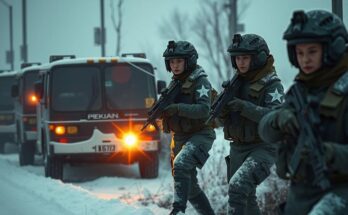Turkey conducted airstrikes in Kurd-held areas of Syria and Iraq, resulting in 12 casualties, in retaliation for an attack on a defense facility in Ankara that left four dead. The SDF condemned the strikes, blaming them for civilian infrastructure damage, as tensions with the PKK continue amid renewed dialogue possibilities.
On Wednesday evening, Turkey executed targeted airstrikes in Kurdish-controlled regions of Syria and Iraq in response to a lethal assault on a state-operated defense manufacturing facility in Ankara. This attack, which involved at least two assailants, resulted in four fatalities and left over a dozen individuals injured. President Recep Tayyip Erdogan attributed the assault to the Kurdistan Workers’ Party (PKK), whom he described as responsible for this reprehensible act against the Turkish Aerospace Industries located near the capital. Verified footage from CBS News illustrated significant damage to electrical infrastructure in both Kobani and Qamishli, the principal cities within the self-governing region predominantly overseen by Kurdish forces in northeastern Syria. The Syrian Democratic Forces (SDF), pivotal allies of the United States in the battle against ISIS, reported the loss of 12 lives, including two children, and noted that 25 others were injured due to extensive Turkish air and artillery attacks. The Turkish Ministry of Defense confirmed targeting 47 alleged “terrorist positions” within Syria and Iraq. General Mazlum Abdi, commander of the SDF, criticized the Turkish military actions as indiscriminate, asserting they impacted civilian infrastructure such as healthcare facilities across northeastern Syria. “We have repeatedly shown our readiness for dialogue. Meanwhile, we affirm that our forces are ready to defend our people and land,” Abdi stated in a communication on the platform known as X. As part of the international coalition against ISIS, approximately 900 U.S. troops remain stationed in the region, acknowledging the SDF’s long-standing role as America’s primary on-ground partner in northeastern Syria. Subsequent to the Ankara attack, the U.S. Department of Defense and Central Command have yet to issue any statements regarding the incident or Turkey’s retaliatory measures. Turkey perceives the U.S.-supported SDF and its associated civilian organization, the YPG, as being directly affiliated with the PKK, which has engaged in a prolonged insurgent campaign within Turkey. The PKK, designated as a terrorist organization by both Turkey and the United States, is believed to maintain its headquarters in the Qandil mountains of northern Iraq, a region frequently targeted by Turkish military operations. There has been no claim of responsibility for the violence in Ankara, which coincides with renewed negotiations between the Turkish government and Abdullah Ocalan, the imprisoned head of the PKK, who has been incarcerated in Turkey for over twenty years. On Thursday, a message conveyed by Ocalan’s nephew, Omer, currently serving in the Turkish parliament, indicated the PKK leader’s willingness to seek resolution to the protracted conflict that has persisted since the mid-1980s. Erdogan’s political ally and leader of the Nationalist Movement Party, Devlet Bahceli, earlier suggested that Ocalan could be invited to address parliament, proposing that his release could be contingent upon the disbandment of the PKK.
The article addresses the escalating tensions between Turkey, the PKK, and U.S.-backed Kurdish forces in Syria, following a violent attack in Ankara. It contextualizes the situation by outlining Turkey’s continued military actions against what it perceives as terrorism, specifically targeting areas in Syria closely associated with Kurdish militias. Moreover, the article highlights the political maneuvering involving Abdullah Ocalan and the potential for peace talks, set against a backdrop of long-standing conflict in the region.
In summary, Turkey’s military response to the recent attack in Ankara underscores the persistent cycle of violence and retaliation involving the PKK and Kurdish forces in northeastern Syria. The SDF’s reports of casualties raise concerns regarding civilian safety amidst ongoing hostilities. The potential for dialogue regarding the decades-long conflict, as suggested by Ocalan’s nephew, indicates a complex landscape where political and military dynamics intertwine. This situation warrants close scrutiny, particularly concerning the role of U.S. forces and the interplay between Turkish domestic security and international relations.
Original Source: www.cbsnews.com




